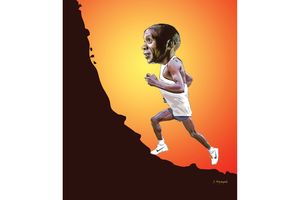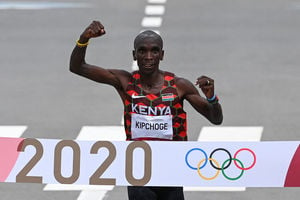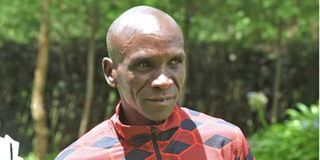
Two-time Olympic Marathon champion Eliud Kipchoge, during the naming of the Paris Olympics Marathon team at Kenmosa Resort in Eldoret town, Uasin Gishu County on May 01, 2024.
For the first time in his glorious marathon career, Eliud Kipchoge appears human.
Until this year, failing to win in two successive races was unchartered territory for the man widely regarded as the greatest marathoner to ever walk the earth.
Kipchoge had lost only two races in a decade - one of them to a world record, but has won only one of his last four races.
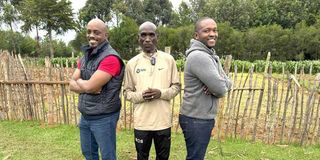
Eliud Kipchoge (centre) poses for a photo with NTV’s Bernard Ndong (left) and James Wokabi during the interview on September 26 at his farm on the outskirts of Eldoret city.
“It’s a new experience for me and I treat it as a challenge. The first ingredient of life is challenge, so if something happens, dust yourself up and try again. So long as you are still giving inspiration to people, then you keep going,” Kipchoge said.
The nadir for the two-time Olympic marathon champion came in Paris in August where he dropped out shortly around the 30km mark. His fifth appearance at the Summer Games would end in a first for him - a DNF (Did not finish).
“I was not expecting to drop out because I had trained at a high level for three months and was 100 percent healthy but such things happen in sports.
“I am a fan of Ultimate Fighting Championships and I watched one of the fights where somebody who was in a gym for six months got knocked out in 53 seconds. Just imagine how that happens! But that’s sport,” the five-time Berlin Marathon winner told Sport On’s Bernard Ndong and this writer when they paid him a visit at his farm on the outskirts of Eldoret.
What inspired him to stay out on the course as his dream of an unprecedented third Olympics marathon title flamed out in the heat of the French capital was how he was treated by spectators after dropping out.
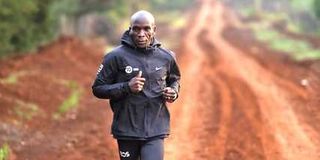
Kenya’s double Olympic marathon champion Eliud Kipchoge during a training session in Kaptagat earlier this year.
“Those fans gave me more heart to continue and made it bearable. I had hundreds of people, 500 people walking with me. I gave them everything; my vest, my shoes, socks, bib number and once I had nothing else to give? They were asking to touch my legs,” he recounts.
Now at the twilight of his career, Kipchoge accepts that he can see the finish line, though he would not be drawn into putting a definite date to it.
“I still want to run a few more marathons and then go on to do other jobs related to sports. I want to do more impactful things around the sports.”
Currently off-season, the 39-year-old spends time every week on his expansive farm where he rears livestock, and grows wheat and maize for silage.
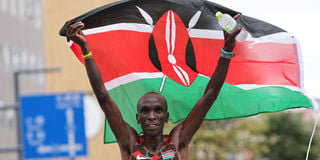
Kenya's Eliud Kipchoge celebrates after winning the men's marathon final during the Tokyo 2020 Olympic Games in Sapporo on August 8, 2021.
“They say everyone is moulded by the environment and having a farm is part of our life, our culture. I have 20 cows and 50 to 60 sheep. I come here once a week when I am in training but when am not in season, I come twice a week,” he says.
“This farm gives me joy. After one week of hard training, I come to see the animals and that makes me happy, and takes me away from the stress of the sport.”
Unparalleled success
To say that Kipchoge has had a successful career would be an understatement.
Already an accomplished athlete on the track, Kipchoge’s career took on a whole new trajectory when he switched to road running after missing out on selection for the 2012 London Olympics.
Besides his two Olympic and five Berlin Marathon titles, Kipchoge has four London Marathon victories, two world records and remains the only man to run the marathon distance in under two hours.

Eliud Kipchoge and Isuzu East Africa Managing Director Rita Kavashe launch the Kipchoge Limited Edition Isuzu D-Max on May 25, 2023 at General Motors in Nairobi.
“A lot has happened since I made my debut in Hamburg. I have run under two hours, I broke the world record twice, and won two Olympic golds medals. I didn’t know that I would do as well as I have done, I just grew bit by bit, getting motivation everyday, getting faster everyday.”
With such incredible success comes the inevitable fame, attention and notoriety, but Kipchoge has shunned all that maintaining a monastic lifestyle.
“Being grounded makes you present. I believe that we should all be humble.
What has killed many people is a disease called ‘special’. If you want to be special then you have that disease. I believe that if all of us are treated as ordinary people, then we will go far.
I have been in places where people are not grounded, and I sympathise with them. When you stay grounded, you learn things; you understand more of what is going on around you.”
Limited edition
Kipchoge generally takes everything in his stride, hardly gets excited about his achievements but his face breaks into a boyish smile when we speak about the Limited edition Isuzu D-Max double cab pick-up truck named after him.
“I feel happy when I drive a car named after me, knowing that I have created impact in society. It was always my plan to have impact on humanity, the car is fulfilment that I achieved that. When I was young, I didn’t think that one day I would run the I way I ran and have the impact I have had.

Eliud Kipchoge and Isuzu East Africa Managing Director Rita Kavashe launch the Kipchoge Limited Edition Isuzu D-Max on May 25, 2023 at General Motors in Nairobi.
That people would be interested in what I have done that they would actually name a car after me? It’s a privilege and its good for the next generation to see that when you are consistent? You bring opportunity and success.”
Endorsements
The limited edition car is probably the pinnacle for Kipchoge who developed other facets of his career.
“I first realized that there was more to athletics in Beijing 2008 Olympics. There was an athlete from Global Athletics who was doing a lot more off the track, and that got me thinking. I was able to see that there was more that one can do as an athlete.”
What followed was a raft of endorsement deals as he quickly expanded his influence locally and internationally, his most recent venture being appointed a UNESCO Goodwill Ambassador.
“Sport has always been more than just competition; it’s a universal language that teaches us teamwork, self-discipline, and the importance of integrity. These values have shaped my journey as an athlete, and continue to guide me in everything I do.”
Along the way, he has earned a reputation as a straight talker, someone who speaks his mind, which does not always sit well with his Kenyan distance-running peers.
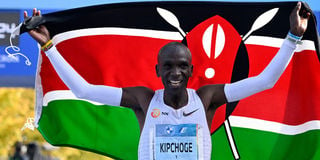
Kenya's Eliud Kipchoge celebrates after winning the Berlin Marathon race on September 25, 2022 in Berlin.
“I always differentiate between being nice and being kind. I always say that I am kind and not nice. I don’t want to be nice because I want to always speak the truth. If you say the truth, it pays you back. But if you want to impress everyone, if you want everyone to be happy, then you’re selling a bad idea, and you know what they say? If you have courage to say bye bye, then you’re successful.
This straight-talking and principled nature has earned him few friends among fellow athletes who have fanned claims that he’s arrogant, aloof and withdrawn.
“What people say doesn’t bother me. Some do get under my skin, but at the end of the day, you can’t control all these things, it’s life so you let them flow.”
Kiptum’s death
Talk turns on the tragic death of Kiptum - the man who only months earlier, had shattered his world record at the 2023 Chicago Marathon - at 24 in a road accident in February.
“I mourned Kiptum for only 15 minutes - the rest wasn’t mourning. I was just back from training with my mates when a bodaboda guy informed us that Kiptum had died.
“I quickly showered, then I got on my phone and instead of mourning, all I saw were the allegations that I was the one who had killed him. I really tracked the time. He died at about 11pm and by midnight, discussions were there that I was responsible,” Kipchoge says.
Such was the hate spewed across different digital platforms as trolls threatened him and his family.
“It was a bad day. Many people discussed how to burn my house, harm my children, and burn our camp. It was very scary because I still had to go out and train and I don’t run with bullet proof vest, so getting me would be easy.
“I was really surprised to read all those things and how quickly people concluded and agreed that I was involved. It even became political while some athletes and even training mates also said I was involved.
As the tragic story unfolded, Kipchoge was in for a rude shock.
“Tribalism is real Wokabi, training mates I had been friends with for almost 20 years all over sudden turned against me. All the trust and friendship was gone. I couldn’t even stay in my own camp. It was that bad.”
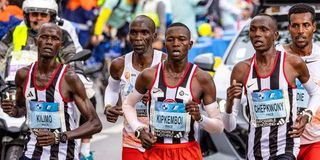
Kenya's Eliud Kipchoge (2nd L) is surrounded by pace runners as he passes the 22km mark in the men's race of the Berlin Marathon on September 24, 2023 in Berlin, Germany.
And how has he moved on from one of the darkest moments of his life?
“I try and handle criticism slowly and in bits. It’s like when you cook ugali, and remove it, there is what remains on the sufuria and you have to pour water in it and then it comes off slowly. I deal with it that way.
“You must realize that clean water and dirty water both help plants grow so whether something is said in a negative or positive way, it’s all for the greater good and how I handle it determines the outcome,” he now says.
“In life they say, 97 percent of the people are negative thinkers and only three are positive, and that is why I urge that we should all strive to be in the three percent.”
Kipchoge’s eldest daughter is in her final year of secondary school and like any parent, he is anxious as she prepares for her Kenya Certificate of Secondary School Education (KCSE) exams.
“I am really getting nervous and trying to push her to work hard. I am happy that my career is ending as my daughter is sitting her Form Four exams; if my daughter joins university, then I think I will be done. The happy moment of every parent is when the first born starts to work, then you as a parent can scale down what you’ve been doing.”
